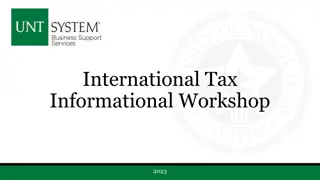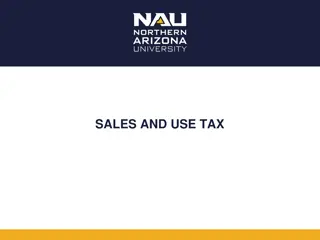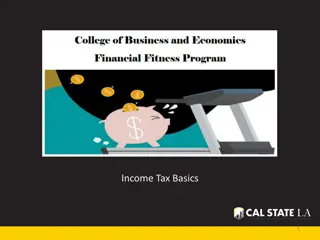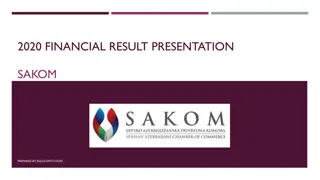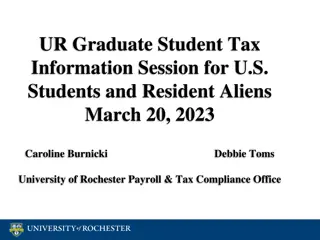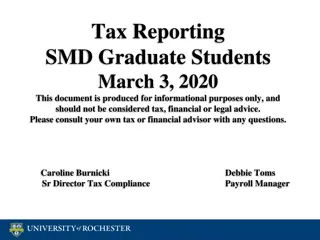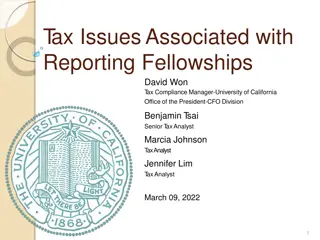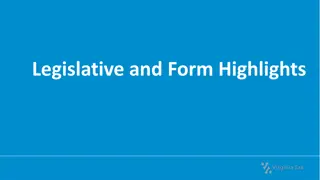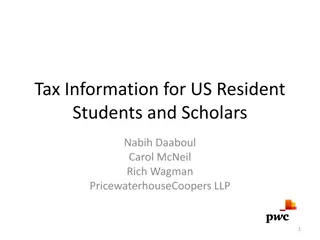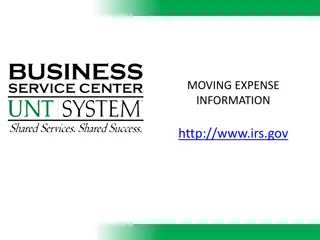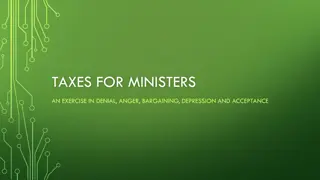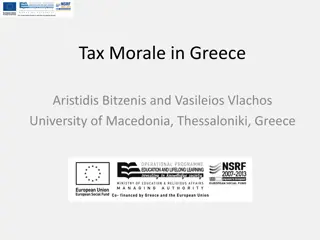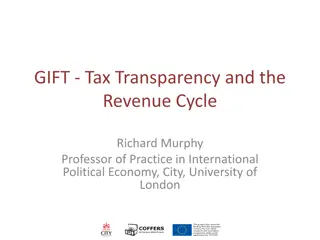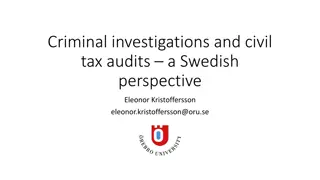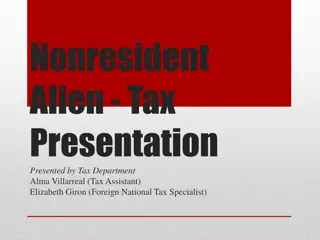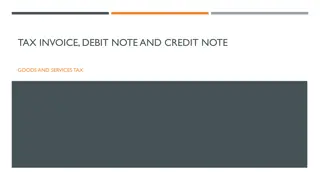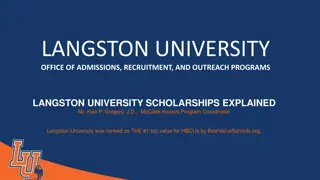Understanding Taxable Scholarships at International Tax Informational Workshop
Explore the essentials of taxable scholarships at an informational workshop for international students and employees. Learn about compensatory payments, Forms W-2 and 1042-S, and how to differentiate between qualified and non-qualified education expenses to manage tax liabilities effectively.
Download Presentation

Please find below an Image/Link to download the presentation.
The content on the website is provided AS IS for your information and personal use only. It may not be sold, licensed, or shared on other websites without obtaining consent from the author. Download presentation by click this link. If you encounter any issues during the download, it is possible that the publisher has removed the file from their server.
E N D
Presentation Transcript
International Tax Informational Workshop 2020
Objective The objective of this workshop is to provide information to our international students and employees. The information provided does not constitute tax advice. If a student or employee has questions about computing their personal tax liability, they would need to contact a qualified third party tax adviser or tax accountant/CPA.
Introduction During this workshop we will cover: Some general tax information related to compensatory payments UNT System makes to its nonresident and resident alien students and employees Information regarding Forms W-2 and 1042-S, including important dates Tips and reminders
Taxable Scholarships Examples of Compensatory Payments made by UNT System 1. Taxable Scholarships IRS Publication 519. A scholarship or fellowship is excludable from income (not taxable) only if: 1. You are a candidate for a degree at an eligible educational institution, and 2. You use the scholarship or fellowship to pay qualified education expenses. You are a candidate for a degree if you: 1. Attend a primary or secondary school or are pursuing a degree at a college or university, or 2. Attend an accredited educational institution
Taxable Scholarships Examples of Compensatory Payments made by UNT System (continued) Qualified Education Expenses Tuition and fees required to enroll at or attend an eligible educational institution, and Course-related expenses, such as fees, books, supplies, and equipment that are required for the courses at the eligible educational institution. These items must be required of all students in your course of instruction. Non-Qualified Education Expenses Include the cost of Room and board Travel (Except if traveling for UNT System purposes, such as traveling as part of an athletic team, debate team, etc.), Research, Clerical help, or Equipment and other expenses that are not required for enrollment in or attendance at an eligible educational institution.
Taxable Scholarships Examples of Compensatory Payments made by UNT System (continued) Taxable Scholarship Amounts used to pay for non-qualified expenses Any amount that exceeds qualified expenses
Taxable Scholarships Taxable Scholarship Example Example 1. Dahlia is enrolled at UNT, an accredited institution, and is pursuing a degree in Mathematics. Dahlia is very smart and was awarded a $20,000 scholarship. Dahlia s expenses are as follows: Tuition and fees required for enrollment at UNT: $12,000 Course-related expenses for books and required supplies: $1,000 Clothes: $1,500 Room and Board: $3,500 How much of Dahlia s scholarship is taxable?
Taxable Scholarships Taxable Scholarship Example (continued) There are different ways to think through the answer, but answer can be calculated as follows: Tuition $ 20,000.00 Tuition and fees for enrollment $ (12,000.00) Course related books and supplies $ (1,000.00) Taxable $ 7,000.00
Taxable Scholarships Taxable Scholarship Example (continued) Example 2. Caleb is enrolled at UNT, an accredited institution, and is pursuing a degree in Physics. Caleb was awarded a $15,000 scholarship. Caleb s expenses are as follows: Tuition and fees required for enrollment at UNT: $10,000 Course-related expenses for books and required supplies (rented books online): $250 Room and Board (Staying with US relatives and only pays for food): $1,750 Furniture: $3,000 How much of Caleb s scholarship is taxable?
Taxable Scholarships Taxable Scholarship Example (continued) There are different ways to think through the answer, but answer can be calculated as follows: Tuition $ 15,000.00 Tuition and fees for enrollment $ (10,000.00) Course related books and supplies $ (250.00) Taxable $4,750.00
Taxable Scholarships Examples of Compensatory Payments made by UNT (continued) UNT would be required to withhold 14% of the taxable scholarships provided to certain nonresident alien students on an F, J, M ,or Q visa. So if Dahlia is a nonresident alien student here in the US on a J visa, UNT would withhold $980 or 14% of $7,000, from Dahlia s scholarship. If Dahlia was not a candidate for degree at UNT, UNT may have to withhold 30% from the taxable scholarship.
Wages Examples of Compensatory Payments made by UNT (continued) 2. The second most common source of income paid by UNT System to students or employees is payment for services.
Forms W-2 and 1042-S Tax Reporting Form W-2 As required by the IRS, payroll offices must report wages paid to a NONRESIDENT ALIEN which are exempt under a tax treaty on Form 1042 and Form 1042-S. Any additional wages paid to a NONRESIDENT ALIEN over and above the exempt amount are reported on Form W- 2 in the normal manner. Regular wage/salary reporting (for those that aren t relying on exemptions or treaties), is also reportable on Form W-2. Payments to resident alien employees are reported on Form W-2 Form 1042-S Taxable Scholarship payments to nonresident aliens Payment for services to nonresident aliens in some situations, see above*
Resident Aliens Resident Aliens Tax Treatment Resident Aliens are treated the same way as US citizens for tax purposes. The IRS provides rules for determining whether you are a nonresident or resident alien. UNT System s determination of residency status is based on the accurate completion and submission of the UNT System Foreign National Form (Form should be provided by all international visitors, especially those that receive payments from UNT System)
Foreign National Form UNT System Tax Department uses the Foreign National Form to: Verify resident status (nonresident alien or resident alien) Verify and apply treaty benefits Verify whether nonresident alien employees are required to pay FICA, etc. Ensure that nonresident aliens Form W-4 is properly prepared https://www.untsystem.edu/foreign-national-form
FICA Speaking of FICA Resident Aliens, in general, have the same liability for Social Security/Medicare Taxes that U.S. Citizens have. Nonresident Aliens, in general, are liable for Social Security/Medicare Taxes on wages paid to them for services performed by them in the United States. Certain classes of nonimmigrants and nonresident aliens are exempt from U.S. Social Security and Medicare taxes including those in the US with: F-visas, J-visas, M-visas, Q-visas. Nonresident Alien students, scholars, professors, teachers, trainees, researchers, physicians, au pairs, summer camp workers, and other aliens temporarily present in the United States in F-1,J-1,M-1, or Q-1/Q-2 nonimmigrant status are exempt on wages paid to them for services performed within the United States as long as such services are allowed by USCIS for these nonimmigrant statuses, and such services are performed to carry out the purposes for which such visas were issued to them. (With some limitations and exceptions)
FICA Who is Subject to FICA (continued) UNT System cannot provide a Social Security and Medicare (FICA) exemption for qualifying nonresident aliens, unless the UNT System Foreign National Form is submitted to the Tax Department, with the required supporting documentation. Nonresident Aliens may note that they are not paying FICA in the spring and fall semesters. For nonresident aliens that have not turned in the Foreign National Form, this would most likely be due to the student-FICA exception: In brief, an individual who is a half-time undergraduate student or a half-time graduate or professional student (half-time student) will qualify for the student FICA exception, provided that the individual is not a professional employee of the institution. Whether someone is a half-time undergraduate or graduate student is determined based on rules established and applied by the University colleges. When enrollment changes, a nonresident alien student/employee that has not turned in the foreign national form would have FICA deducted from their pay.
Common Issues Issues and Answers 1. Qualifying nonresident alien students not paying FICA in the spring or fall based on their course-load, but paying FICA during the summer. Resolution: Turn in Foreign National Form with supporting documentation 2. Employees and students not promptly obtaining and submitting a Social Security Number or ITIN. Form 1042-S and W-2 would therefore have all 0s for the Social Security Number/ITIN. Resolution: Employees and students will not be able to file with the IRS without a valid Social Security Number or ITIN, if applicable. Upon receipt of the Social Security Number, students/employees should provide this information to the I-9 coordinator or Campus HR as appropriate: https://international.unt.edu/sites/default/files/HOURLY%20Social%20Security%20Card%20Guide.pdf Once the Social Security Number or ITIN is provided to the appropriate personnel the individual should contact the Tax Department asking for us to amend the Form W-2 or 1042-S. *Note: An ITIN is only available to resident and nonresident aliens who are not eligible for U.S. employment and need identification for other tax purposes. An individual with an ITIN who later becomes eligible to work in the United States must obtain an SSN.
Common Issues Issues and Answers (continued) 3. Nonresident aliens submitting Form W-4 as a resident alien: Nonresident aliens need to ensure that the Foreign National Form is on file. Upon submission of the Foreign National Form, the Tax Department can help ensure that your Form W-4 is properly prepared. Nonresident aliens are required to follow the special instructions contained in Notice 1392. The failure to turn in the Foreign National Form; and a nonresident alien filling out the Form W-4 as a resident alien, can lead to a substantial tax liability. Resolution: Verify that you have submitted the Foreign National Form. Verify that your W-4 conforms to Notice 1392, if a nonresident alien. https://www.irs.gov/pub/irs-pdf/n1392.pdf
Tips A Few Tips 1. If you need assistance from the Tax Department concerning forms issued by the Tax Department, or for questions regarding the foreign national form, email sys-fn@untsystem.edu 2. Forms W-2 are provided in January (before the 31st), each year 3. Make sure your mailing address is up to date, if you expect to receive Form 1042-S (Your mailing address on file is the address used to mail out Forms 1042-S). Forms 1042-S will be mailed out by March 15, each year 4. The UNT System Tax Department will send a list out of UNT students and employees received Form 1042-S to the International Office in early March.
Tips A Few Tips (continued) 5. When campuses are open: If you want to speak with someone in the Tax Department, it is advisable that you schedule an appointment to make sure that you receive proper service (Someone may not be available to help if you stop by without scheduling an appointment).
Selected Reference Material References for Foreign Students and Scholars: https://www.irs.gov/individuals/international- taxpayers/references-for-foreign-students-and-scholars Publication 519 (IRS has not updated the publication for 2020 yet): https://www.irs.gov/pub/irs- pdf/p519.pdf Publication 901 (last revised 2016): https://www.irs.gov/pub/irs-pdf/p901.pdf


